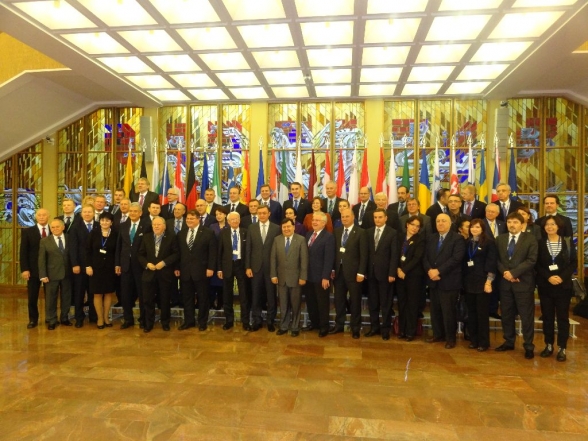Within the parliamentary activities of the semi-annual Lithuanian presidency over the European Union, in Vilnius, in the period from 27 to 28 November, the Meeting of the Chairpersons of the Committees on Foreign Affairs of the National Parliaments ofthe EU and the Parliamentary Forum was held, where the Delegation of the Committee on International Relations and Emigrants of the Parliament of Montenegro participated, in the following composition: Chairperson of the Committee, Mr Miodrag Vuković, professor PhD; and the members of the Committee Ms Žana Filipović and Mr Goran Danilović.
The last in the series of meetings of the parliamentary dimension of the Lithuanian presidency of the EU was dedicated to democracies in transition, promotion of democracy in the world and EU Eastern Partnership awaiting the holding of the “Third Summit of the Eastern Partnership”, which will be held on 29 November in Vilnius.
Within the three sessions, the following, among others, addressed the participants of the gathering: Mr Linas Linkevičius, Minister of Foreign Affairs of the Republic of Lithuania; Mr Vytautas Landsbergis, the Chair of the Supreme Council of the Republic of Lithuania, and a member of the European Parliament; Mr Igor Corman, Speaker of the Parliament of the Republic of Moldova; Mr Karim Ghellab, President of the Chamber of Representatives of Morocco; Mr Pat Cox, member of the European Parliament, and Mr Vitali Klitschko, member of the Ukrainian Parliament.
The support to the EU policy aimed at global promotion of democracy and observation of key values and principles of the “Universal Declaration of Human Rights” was pointed out at the meeting, and in that sense an assessment was made that there still was a significant number of states and regimes that, in an authoritative and totalitarian manner, continuously and systematically violate human rights and prevent the development of democracy.
During the session relating to the “EU Eastern Partnership”, it was pointed out that the last enlargements had brought European Union closer to the countries of the East Europe and the South Caucasus, thus directly linking the issue of security to stability and prosperity of Ukraine, Moldova, Belarus, Georgia, Armenia and Azerbaijan. With that regard, the strategic importance of the Eastern Partnership for the EU and for the wider region of Europe was pointed out, in order to achieve long-term benefits for all the countries concerned. Strengthening of democracy, rule of law, observation of human rights, market economy, and good governance are key values of the Eastern partnership policy, it was concluded in the meeting.
Awaiting the EU Eastern Partnership Summit, the expressed expectations included the following: that the progress would be achieved and that the signing of the Association Agreement and the Agreement on Expanding the Free Trade Zone with the Republic of Ukraine would follow, as well as that the signing of similar agreements with the Republic of Moldova and the Republic of Georgia would be initiated.









